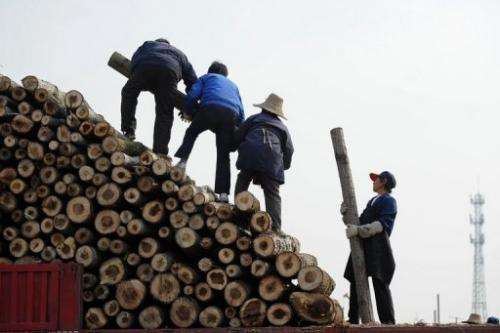China demand fuels illegal logging, report says

The preservation of the world's forests "is in China's hands", a top environmental campaign group said Thursday, accusing the biggest wood importer and consumer of fuelling the illegal timber trade.
"China's role as the world's biggest timber trader means that further progress against illegal logging depends on the nation taking measures," the London-based Environmental Investigation Agency (EIA) said in a report released in Beijing.
"Yet while other major consumer markets have acted, China remains firmly on the sidelines."
China's demand for foreign wood has tripled since 2000 to reach 180 million cubic metres last year—enough to fill Beijing's iconic Bird's Nest stadium, which hosted the Olympics, more than 60 times.
At least a tenth of those imports came from illegal sources, the EIA said, basing the figure on trade data analysis and illegal logging rates in certain exporting nations. It said it was a conservative estimate with the reality "likely to be far higher".
"The fate of much of the world's natural forests is in China's hands," it said, accusing Beijing of a "stated unwillingness to explicitly prohibit illegal timber trade".
Over the past decade the European Union, United States and Australia have passed laws to better regulate or ban illegal timber, while Japan and other countries were considering similar moves, it said.
China had proposed a government-to-government verification scheme and code of conduct for Chinese businesses overseas, but the EIA said these did not guarantee effective enforcement.
"Any of the improvements made through legislation in the EU or in the US or now in Australia will come to nothing if China does not do the same," Jago Wadley, a senior campaigner for the organisation, told reporters on Thursday.
Beijing's foreign ministry spokesman Hong Lei stressed China's desire to stop unlawful practices and encourage sustainable development.
"We are opposed to the illegal farming and trade of timber," he said, adding China sought to "enhance the protection of forestry resources across the world and we would like to make more contributions in this regard".
Between 75 and 85 percent of wood products made in China stay in the country, the EIA said, citing Deutsche Bank and other sources, limiting its need to abide by other nations' timber regulations.
"China's rapidly growing domestic consumer market is the main absorber of illegal timber imported into the country," the EIA said, "and without action will be chief driver of illegal logging worldwide into the future".
The report said Chinese demand for wood had impacted countries from the nearby Mekong region to as far as Africa.
During Liberia's civil war in the early 2000s its timber exports to China rose faster than any other African country—a trade that incurred a rare ban by the United Nations in 2004 for funding Charles Taylor's brutal government.
Surging demand for rosewood in China—used in traditional furniture and whose value has jumped 25 percent in a year—has fed "a climate of corruption and conflict" in Southeast Asian supplier nations, the organisation added.
Thailand has intercepted 3,000 illegal exports of rosewood worth $3 billion, it said, while Chinese traders had been reported working with Vietnamese gangs to secure illegal supplies.
The hunt for rosewood has driven Chinese traders ever deeper into source areas, said EIA campaign leader Julian Newman.
"You have to go further and further, that means more checkpoints, more bribes," he said. "So again there is a displacement effect, you have to move to other places."
(c) 2012 AFP












